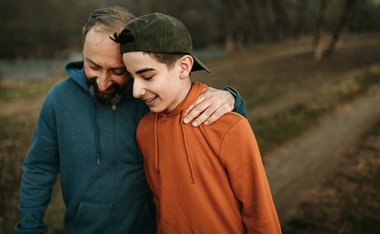The views expressed in our content reflect individual perspectives and do not represent the authoritative views of the Baha'i Faith.
My wife and I have a dear friend who recently and tragically lost her son to opioid addiction. I say “lost” — but he died from his addiction, sadly and suddenly. Can you imagine a worse parental nightmare?
Your child, who you loved so dearly and raised so carefully, grows up and becomes an addict. One day the street drugs he takes turns out to have a little too much fentanyl, and he’s gone.
Our friend’s nightmare has come true for millions of parents around the world lately, with the global opioid epidemic expanding exponentially.
RELATED: Opioids and the Loss of a Child: Heartened through Heartbreak
So here’s a very serious question: what can parents do, especially in early childhood, to protect their children from the terrible consequences of drug use, drug abuse, drug addiction, and death?
In our age, this single question may be the most consequential one a parent can attempt to answer.
Maia Szalavitz, the author of “Unbroken Brain: A Revolutionary New Way of Understanding Addiction,” has an interesting spiritual conclusion and recommendation regarding that question. In a 2016 article in “Scientific American,” she says that drug addictions are essentially learning disorders and that all addictions:
… really involve the same fundamental problem: a difficulty with self-regulation. This may appear predominantly as an inability to inhibit strong impulses, it may be largely an impairment in modulating negative emotions like anxiety, or it may have elements of both. In any case, difficulties with self-regulation lay the groundwork for learning addiction and for creating a condition that is hard to understand. The brain regions that allow self-regulation need experience and practice in order to develop. If that experience is aberrant or if those brain regions are wired unusually, they may not learn to work properly.
Are you training your children to self-regulate? Are you giving them enough experience, knowledge, and practice to fully develop those important self-regulatory brain regions?
To help accomplish those goals, here are a few suggestions from the Baha’i teachings:
1. Teach Children About God.
Regardless of your religion or lack of one, your children can benefit from knowing they were created in the image of a divine Creator — noble, good, loving, and kind. If they want to investigate that premise later as adults, they certainly can, but children who grow up believing that a beneficent, loving God watches over them also tend to absorb the moral, self-regulatory skills that allow them to refrain from indulging their lower instincts as often.
A Harvard Medical School study recently found that those who regularly practiced their faith had significantly diminished risks of death from suicide, drug addiction, or alcohol poisoning. When children receive a spiritual education, drug use and drug addiction decline, multiple studies have shown.
… from the very beginning, the children must receive divine education and must continually be reminded to remember their God. Let the love of God pervade their inmost being, commingled with their mother’s milk.
2. Emphasize Character Development
As you raise your children, praise them when you see them acting on their noblest, most spiritual inner character traits. When they share, when they’re kind, when they selflessly do things for others, strive through praise, enthusiasm, and encouragement to make those positive spiritual traits a permanent part of their identities. Educate your children in schools that emphasize character development, and pay particular attention to their inner spiritual development at home, as well. The Baha’i teachings recommend that parents:
… should consider the question of goodly character as of the first importance. It is incumbent upon every father and mother to counsel their children over a long period, and guide them unto those things which lead to everlasting honor.
In a child-rearing piece of advice meant to reduce entitlement and selfishness, Abdu’l-Baha also wrote:
Training in morals and good conduct is far more important than book learning. A child that is cleanly, agreeable, of good character, well-behaved — even though he be ignorant — is preferable to a child that is rude, unwashed, ill-natured, and yet becoming deeply versed in all the sciences and arts. The reason for this is that the child who conducts himself well, even though he be ignorant, is of benefit to others, while an ill-natured, ill-behaved child is corrupted and harmful to others, even though he be learned. If, however, the child be trained to be both learned and good, the result is light upon light.
RELATED: The Dire Baha’i Warning About Opioids
3. Set High Ideals and Goals
For the maximum self-regulatory effect in children, encourage them towards high goals and ideals — and then let them struggle to achieve those goals on their own. Teach them practical skills, things they can master by doing. Don’t hover, don’t do school assignments for them, and don’t over-protect. As Abdu’l-Baha suggested, “Bring them up to work and strive, and accustom them to hardship.” By doing this, you’ll allow your children to develop a sense of accomplishment and achievement by themselves. The Baha’i teachings urge parents to create an environment of order and discipline along with those high ideals, and challenge your children to achieve greatness:
Children are even as a branch that is fresh and green; they will grow up in whatever way ye train them. Take the utmost care to give them high ideals and goals, so that once they come of age, they will cast their beams like brilliant candles on the world, and will not be defiled by lusts and passions in the way of animals, heedless and unaware, but instead will set their hearts on achieving everlasting honour and acquiring all the excellences of humankind.
All of these suggestions from the Baha’i writings may initially seem far removed from guarding against the risk of addiction in the teenage and early adult years, but they will help sprout and strengthen the skills children need for that crucial initial decision they’ll have to make when a peer offers them their first chemically-induced high. Today many children will face that moral, psychological, and spiritual test early and often, and those with strong, self-regulating inner characters will be the ones most likely to pass it.
This Baha’i prayer for all people exemplifies the hopes every good parent has for their children:
O Divine Providence! Bestow Thou in all things purity and cleanliness upon the people of Baha. Grant that they be freed from all defilement, and released from all addictions. Save them from committing any repugnant act, unbind them from the chains of every evil habit, that they may live pure and free, wholesome and cleanly, worthy to serve at Thy Sacred Threshold and fit to be related to their Lord. Deliver them from intoxicating drinks and tobacco, save them, rescue them, from this opium that bringeth on madness, suffer them to enjoy the sweet savours of holiness, that they may drink deep of the mystic cup of heavenly love and know the rapture of being drawn ever closer unto the Realm of the All-Glorious.
You May Also Like
Comments

















"While the children are yet in their infancy feed them from the breast of heavenly grace, foster them in the cradle of all excellence, rear them in the embrace of bounty. Give them the advantage of every useful kind of knowledge. Let them share in every new and rare and wondrous craft and art. Bring them up to ...work and strive, and accustom them to hardship."